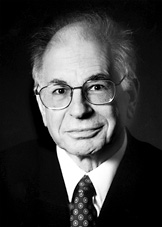Pthoto retrieved from http://www.nobelprize.org/nobel_prizes/economic-sciences/laureates/2002/kahneman-bio.html
According to the website of WWS, Sir Daniel Kahneman is a
psychologist. He is the Eugene Higgins Professor of Psychology Emeritus at
Princeton University, Professor of Psychology and Public Affairs Emeritus
at the Woodrow Wilson School, and a fellow of the Center for Rationality
at the Hebrew University in Jerusalem. Besides, Professor Kahneman has
held the position of professor of psychology in many
universities worldwide. As a psychologist,
he integrated psychological insights into economics, and was
awarded the Nobel Prize in Economic Sciences for his pioneering work in this
field the year of 2002. During recent years, Professor Kahneman has been focus
on researching on various aspects of experienced utility.
I did not hear about Professor Kahneman until I take this
class, but I do agree that it is necessary to apply psychological insights to
economics sometimes. For example, in a lecture of this week, Professor Arvan
talked the theory of motivation, and linked it to economic concepts. I think
this is a great example that reflects how psychology can be related to
economics, and demonstrates that Professor Kahneman's work is significant.
Reference
1.http://www.princeton.edu/~kahneman/
2.http://www.nobelprize.org/nobel_prizes/economic-sciences/laureates/2002/kahneman-bio.html

Kahneman's primary research, which he did with Amos Tversky who has since passed away, concerned how human beings process statistical information. It turns out that we're not very good at it at all and have many built in biases. So his research shows that assuming rationality is a heroic rather than realistic assumption. He also laid the foundations to the branch of the discipline that is now called Behavioral Economics.
ReplyDelete